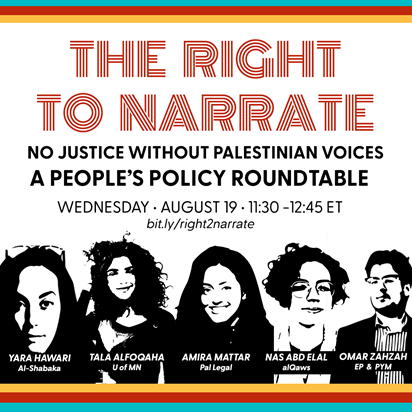Webinars, conferences and other events available online for streaming
The new realities of life during Covid-19 in 2020 have produced an explosion in online gatherings, including hundreds organized this year by and for the movement for Palestinian rights.
On this page, a curated selection of the many worthwhile recorded events in 2020: webinars, conferences, interviews, and more.
LOOKING FOR COMING EVENTS?
Find them here
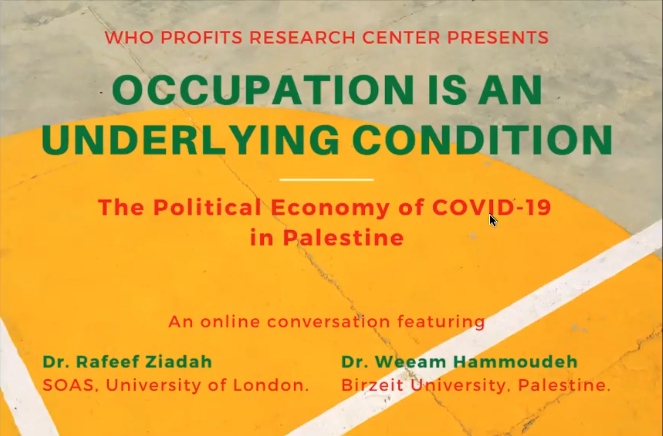 Occupation is an Underlying Condition: The Political Economy of COVID-19 in Palestine
Occupation is an Underlying Condition: The Political Economy of COVID-19 in Palestine
27 April 2020
Who Profits
The global nature of the present pandemic demands a truly global perspective, attentive to the ‘underlying conditions’ of uneven capital accumulation, colonial exploitation and military occupation. In occupied Palestine, structural dedevelopment, dependence and colonial violence give particular form to the health and economic risks caused by COVID-19.
Dr. Rafeef Ziadah and Dr. Weeam Hammoudeh discuss the political economy of COVID-19 in occupied Palestine and the root causes shaping the impact and response to the crisis, including with regards to Palestinian labour and healthcare. Dr. Rafeef Ziadah is a Lecturer in Comparative Politics of the Middle East at SOAS, University of London. Dr. Weeam Hammoudeh is an Assistant Professor at the Institute of Community and Public Health at Birzeit University, Palestine.
Watch it here
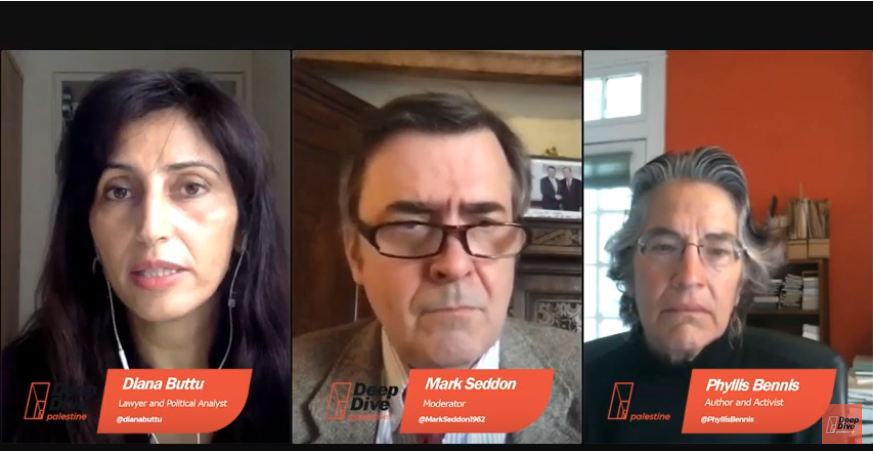 Palestine Deep Dive: Phyllis Bennis and Diana Buttu
Palestine Deep Dive: Phyllis Bennis and Diana Buttu
1 May 2020
Palestine Deep Dive
A Labour Day discussion of Palestinian rights, Israeli annexation plans and the prospect of a Biden presidency. Panelists:
Phyllis Bennis, author, activist and director of the New Internationalism Project at the Institute for Policy Studies
Diana Buttu, lawyer, analyst and former spokesperson and negotiator for the PLO. Mark Seddon, former UN media advisor and Al-Jazeera correspondent, is the host.
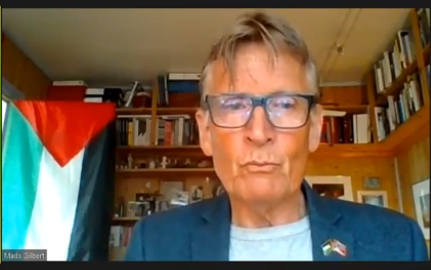 Conversation with Dr Mads Gilbert
Conversation with Dr Mads Gilbert
17 May 2020
Kinder USA
Mads Gilbert is a Norwegian physician, humanitarian, and social activist. He is a specialist in anesthesiology and head of the emergency medicine department at the University Hospital of North Norway and Professor of emergency medicine at the University of Tromsø.
He has spent a great deal of time in Gaza providing medical services and observing and reporting on conditions there. Gilbert written and spoken extensively about the horrific living conditions for Gazans around the world and has receive several awards for his humanitarian work.
Watch it here
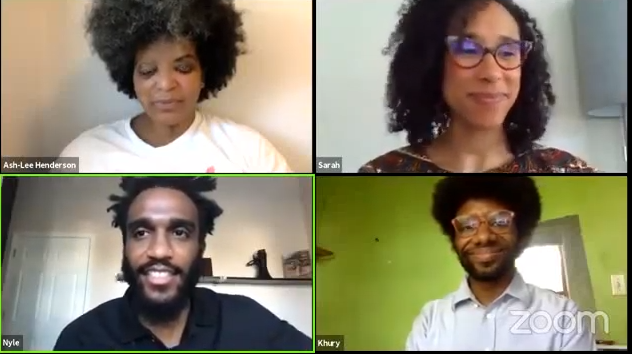 Tied in a Single Garment of Destiny
Tied in a Single Garment of Destiny
21 May 2020
Friends of Sabeel North America (FOSNA) and partners
As people of African descent, our struggle against the racism, economic exploitation, and militarism of the United States, what Rev. Dr. King dubbed the “giant triplets,” ties us to the Palestinian people, as they face these giants as well, under Israeli occupation. And today those most harmed by the triple evils are disproportionately impacted by the giant of the COVID-19 public health crisis. It is more apparent than ever that Palestinians and Black Americans are tied in “a single garment of destiny,” what affects one directly affects the other indirectly. The panel of dynamic thought leaders and activists will reflect on how the triple evils tie together Black and Palestinian stories, our past and present struggles for justice, and the role of the Church and liberation theologies in the march toward freedom.
Ash-Lee Woodard Henderson is an Affrilachian (Black Appalachian), working class woman. She is the Co-Executive Director of the Highlander Research & Education Center in New Market, TN.
Erica N. Williams is an ordained minister, activist and organizer for the Poor People’s Campaign: A National Call for Moral Revival.
Khury Petersen-Smith is the Michael Ratner Middle East Fellow at Institute for Policy Studies.
Nyle Fort is a minister, activist, and Ph.D. candidate in religion and African American studies at Princeton University.
Sarah Nahar is a border-walking scholar-activist working on a PhD in Religion and Environmental Studies in Syracuse, NY (traditional Haudenosaunee land).
Watch it on Youtube or Facebook
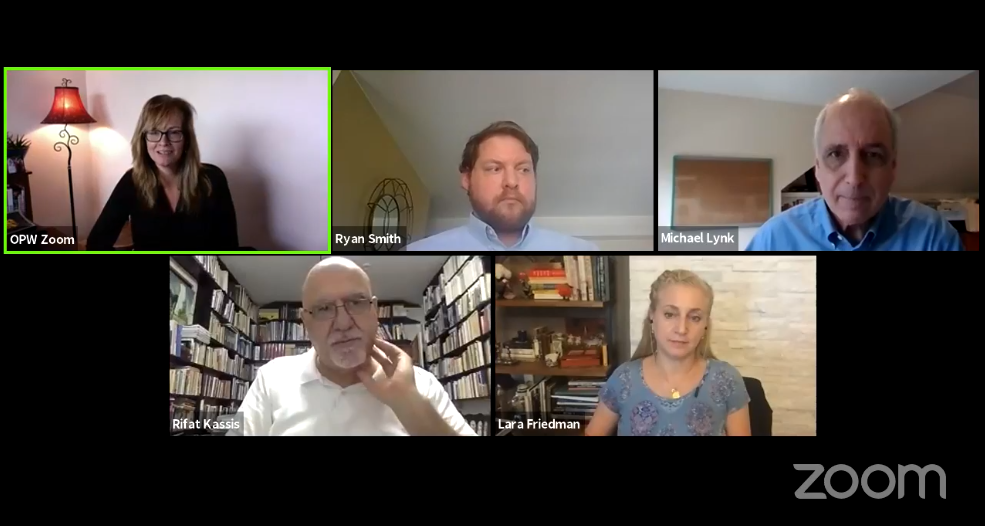 Israeli Annexation: Context and Consequences
Israeli Annexation: Context and Consequences
24 June 2020
Presbyterian Church (U.S.A.)
The webinar featured expert views from Rifat Kassis (Defense for Children International – Palestine), Michael Lynk (UN Special Rapporteur for Human Rights in Occupied Palestinian Territories) and FMEP’s Lara Friedman.
Watch it here
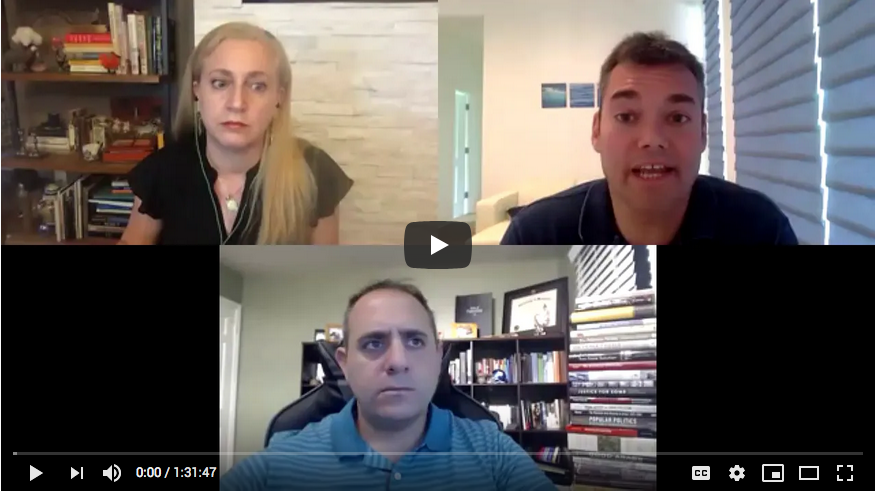 Imagining Together a Shared One-State Reality
Imagining Together a Shared One-State Reality
13 July 2020
Foundation for Middle East Peace
In July 2020 leading Jewish American commentator and journalist Peter Beinart wrote an editorial for the New York Times “I No Longer Believe in a Jewish State” followed by a longer similar piece in Jewish Currents. The arguments articulated by Peter in these two pieces break new ground in the thinking of Liberal Zionist American Jews, and have already provoked a serious debate.
Well-developed thinking along similar lines has been articulated for years by Palestinian intellectual leaders, including, prominently, Yousef Munayyer, who in February 2017 published a piece in Time Magazine entitled, “Let’s Talk About a One-State Solution Where Israelis and Palestinians Are Equal.” More recently, in November/December 2019, Yousef published a piece in Foreign Affairs, entitled, “There Will Be a One-State Solution — But What Kind of State Will It Be?”
Peter Beinart is a Non-Resident Fellow at the Foundation for Middle East Peace. He is also a Professor of Journalism and Political Science at the City University of New York, a Contributor to The Atlantic, an Editor-at-Large at Jewish Currents, and a CNN Political Commentator.
Yousef Munayyer is a non-resident Fellow at Arab Center Washington DC (ACW). He writes on the Arab-Israeli conflict and is a member of the editorial committee of the Journal of Palestine Studies. His published articles can be found in The New York Times, The Washington Post, The Nation, Boston Globe, Foreign Policy, Journal of Palestine Studies, Middle East Policy, and other news publications.
Watch it here
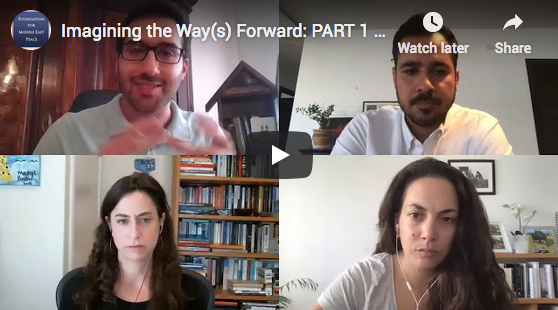 Imagining the Way(s) Forward:
Imagining the Way(s) Forward:
PART 1 – Palestinian Thought Leaders
23 July 2020
Foundation for Middle East Peace (FMEP)
FMEP presents a two-part webinar series (via Zoom) featuring leading Palestinian and Jewish Israeli thought leaders who are exploring different paths toward an equitable, safe, and just future for Palestinians and Israelis, and whose ideas can change the debate and inform policy and opinion shapers in Israel, Palestine, the U.S., and beyond. Listen to and engage these Palestinian and Israeli thought-leaders as they discuss the ideas for new and frameworks and tools needed to imagine and enact a different and more just future.
Salem Barahmeh is the Executive Director of the Palestine Institute for Public Diplomacy. He is currently a Non-Resident Fellow at the US Middle East Project and previously worked as an international affairs advisor to Dr. Hanan Ashrawi at the PLO.
Dr. Yara Hawari is the Senior Palestine Policy Fellow of Al-Shabaka: The Palestinian Policy Network. She is also a frequent political commentator writing for various media outlets including The Guardian, Foreign Policy and Al Jazeera English.
Amjad Iraqi is an editor and writer at +972 Magazine. He is also a policy analyst at Al-Shabaka: The Palestinian Policy Network, and was previously an advocacy coordinator at Adalah – The Legal Center for Arab Minority Rights in Israel. In addition to +972, he has contributed to the London Review of Books, The Guardian, and Le Monde Diplomatique, among other outlets.
Sarah Anne Minkin, PhD, is an expert on the intersection between Israeli civil society and Palestinian civil and human rights advocacy as well as the ways that American Jews approach the Israeli-Palestinian conflict. With the Foundation for Middle East Peace, Sarah Anne works to deepen FMEP’s relationships with existing and potential grantees and build relationships with new philanthropic partners.
Watch it here
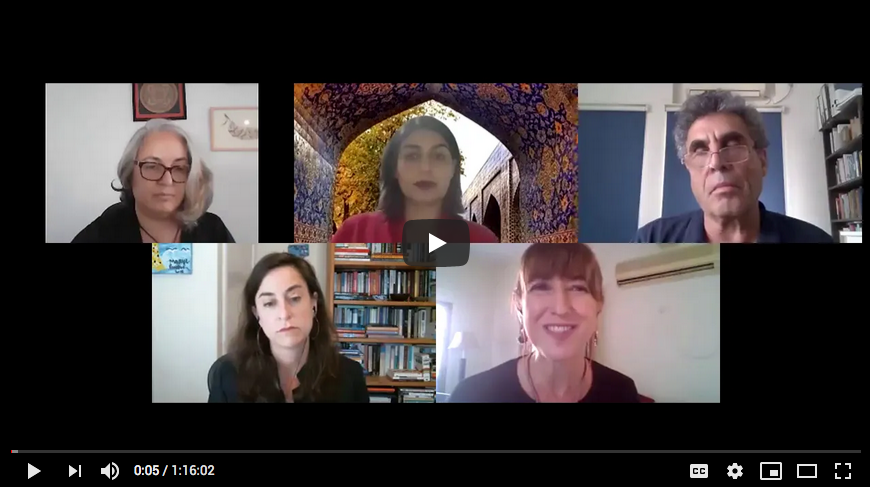 Imagining the Way(s) Forward:
Imagining the Way(s) Forward:
PART 2 – Jewish Israeli Thought Leaders
29 July 2020
Foundation for Middle East Peace (FMEP)
After more than 70 years since the founding of the state of Israel and dispersal and dispossession of hundreds of thousands of Palestinians, more than 50 years of occupation and de facto annexation, and more than 25 years since the Oslo Accords, there is a critical need for thinking that moves beyond failed paradigms and challenges status quo assumptions.
The Foundation for Middle East Peace (FMEP) invites you to join us for two-part webinar series (via Zoom) featuring leading Palestinian and Jewish Israeli thought leaders who are exploring different paths toward an equitable, safe, and just future for Palestinians and Israelis, and whose ideas can change the debate and inform policy and opinion shapers in Israel, Palestine, the U.S., and beyond.
Listen to these Palestinian and Israeli thought-leaders as they discuss the ideas for new and frameworks and tools needed to imagine and enact a different and more just future.
Rachel Beitarie is a the director of Zochrot and a feminist political activist. She was co-founder of PSee, an independent feminist media organization, and media coordinator at Gisha – Legal center for freedom of movement.
Orly Noy is a journalist, translator of Farsi literature into Hebrew, and political and Mizrahi activist. She is an editor at Local Call, member of B’Tselem’s Executive Board and an activist with the Balad political party.
Meron Rapoport is an award winning Israeli journalist who writes for Local Call / 972+ Magazine and collaborates with Middle East Eye. He is one of the founders of A Land for All/Two States One Homeland, an Israeli Palestinian movement promoting a confederative solution between an independent Palestine and an independent Israel.
Dr. Dahlia Scheindlin is a leading international public opinion analyst and strategic consultant specializing in progressive causes, political and social campaigns in over 15 countries. She works for a wide range of local and international organizations dealing with Israeli-Palestinian conflict issues, human rights, peacemaking, democracy, religious identity, and internal social issues.
Sarah Anne Minkin, PhD, is an expert on the intersection between Israeli civil society and Palestinian civil and human rights advocacy as well as the ways that American Jews approach the Israeli-Palestinian conflict.
Watch it here
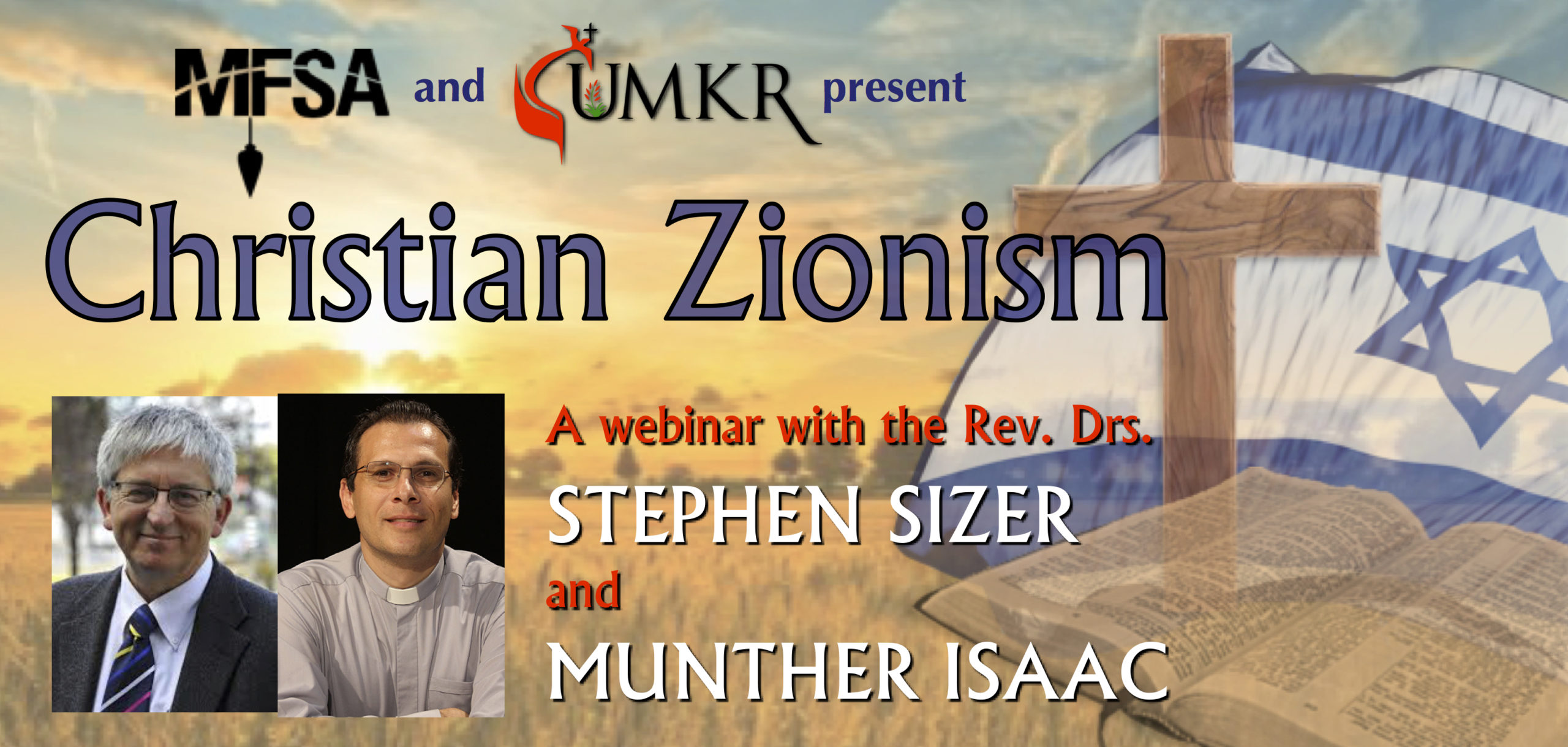 Christian Zionism
Christian Zionism
12 August 2020
United Methodists for Kairos Response (UMKR)
and Methodist Federation for Social Action (MFSA)
MFSA and UMKR present two recognized authorities on Christian Zionism, a disturbing political theology embraced by millions of Americans who now have a tremendous influence on US foreign policy with regard to Israel and Palestine. Our speakers will help us understand the theology of Christian Zionism, why it is an inaccurate interpretation of Scripture, how it is harming Palestinian Christians and the entire Middle East peace process, and how to counter this theology in our churches.
Rev. Dr. Stephen Sizer is an ordained Anglican clergy and a celebrated authority on Christian Zionism. His books include: Christian Zionism: Roadmap to Armageddon and Zion’s Christian Soldiers: The Bible, Israel and the Church. In 2006, he co-authored the “Jerusalem Declaration on Christian Zionism” for the Patriarchs and Heads of Churches in Jerusalem.
Rev. Dr. Munther Isaac is Academic Dean of Bethlehem Bible College and pastor of Christmas Evangelical Lutheran Church in Bethlehem, Palestine. He is the author of From Land to Lands, from Eden to the Renewed Earth: A Christ-Centered Biblical Theology of the Promised Land and The Other Side of the Wall: A Palestinian Christian Narrative of Lament and Hope.
Watch it here
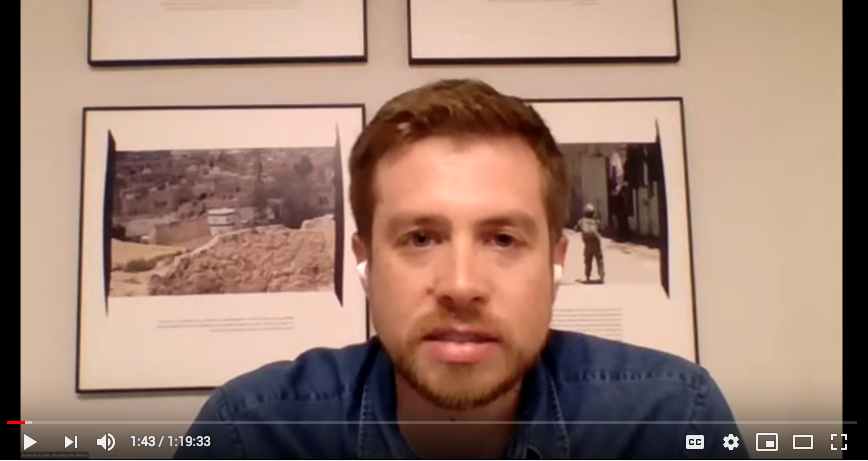 East Jerusalem: An Annexation Case Study
East Jerusalem: An Annexation Case Study
16 August 2020
Breaking the Silence
Despite media reports to the contrary, PM Netanyahu, US Ambassador to Israel David Friedman and others have made it clear that annexation is still very much on the table. But what would annexation actually look like? Unfortunately, we don’t have to look too far. 53 years ago, East Jerusalem was annexed to Israel along with its hundreds of thousands of Palestinian residents. Since then, while Israel boasts about sovereignty over its ‘eternally united capital’, East Jerusalemites have to put up with their houses being destroyed, institutional discrimination, poverty, police violence and political repression.
At the same time, East Jerusalemites are gradually integrating into the Israeli workforce and have become an inseparable part of the delicate fabric of Israel’s capital. In this webinar, speakers discuss East Jerusalem as a case study of what ‘applying Israeli sovereignty’ could mean, with those who know what annexation looks like from up close.
Breaking the Silence Executive Director Avner Gvaryahu moderates this discussion with Nivine Sandouka, an adviser in the field of peace building and women’s rights and Executive Director of the human rights NGO Hoqoqna – Our Rights and Dr. Yudith Oppenheimer, Executive Director of the Jerusalem-based anti-occupation NGO Ir Amim.
Watch it here
The Right to Narrate: No Justice without Palestinian Voice
19 August 2020
See coalition above
An important policy round table by Palestinian grassroots organizers and advocates about what it means for Palestinians to claim their right to narrate, to tell their stories, and to speak back with clear demands for an end to US complicity in Palestinian oppression. In 1984 the late Edward Said would write that Israeli colonization and dehumanization of Palestinians in Western and Israeli media would continue so long as Palestinians were denied “permission to narrate.”
Organizers demanding an end to funding injustice must face the blacklist site Canary Mission, and state legislation criminalizing BDS. All of this makes it painfully clear that Palestinian voices are still considered a threat to an oppressive status quo. But we refuse to be silenced any longer. It’s time for policymakers and our progressive movement to take notice and heed longtime Palestinian demands for accountability and a vision of justice for all that uproots systems of oppression, from the US to Palestine.
–Yara Hawari, Al-Shabaka: The Palestinian Policy Network
–Tala Alfoqaha, Youth organizer at University of MN
–Nas Abd Elal, alQaws
–Amira Mattar, Palestine Legal
–Sahar Francis, Addameer: Prisoner Support and Human Rights Association
–Facilitator: Omar Zahzah, Eyewitness Palestine & Palestinian Youth Movemen
Watch it here
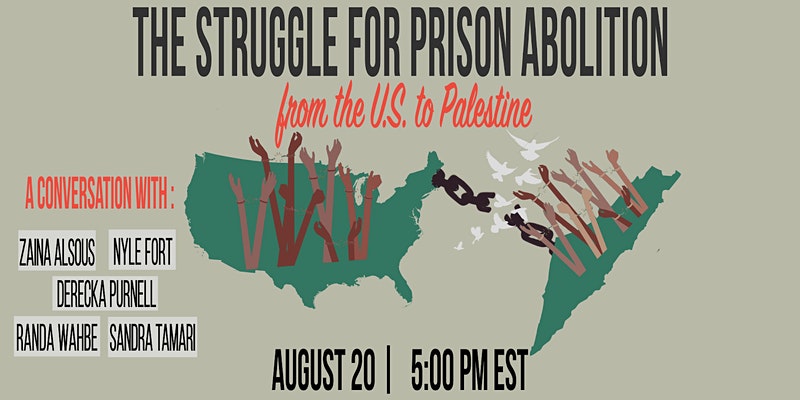 The Struggle for Prison Abolition: From the U.S. to Palestine
The Struggle for Prison Abolition: From the U.S. to Palestine
20 August 2020
Haymarket Books
A historic multiracial rebellion has exploded and sustained across the U.S. in response to the police lynching of George Floyd and others brutalized and killed at the hands of US police. This uprising has coincided with the escalating colonization and annexation of Palestinian land, supported by the white supremacist Trump administration.
Organizers on the ground in the U.S. and in Palestine are using this moment to demonstrate the ongoing connections between colonization and modern militarized policing, and why in order to combat U.S. racial monopoly capitalism and imperialism, we must abolish policing, and all aspects of settler carceral regimes.
This discussion will bring together activists and scholars to examine movements organizing to dismantle the Prison Industrial Complex (PIC) and free political prisoners as part of liberation struggles led by Black people in the U.S. and Palestinian people in occupied Palestine.
Zaina Alsous, an organizer with the Dream Defenders
Nyle Fort, a minister, activist, and Ph.D. candidate at Princeton University
Derecka Purnell, human rights lawyer, organizer, and writer.
Sandra Tamari, Palestinian organizer based in St. Louis, Missouri and is director of the
Adalah Justice Project.
Randa Wahbi, former international advocacy coordinator at Addameer Prisoner Support
and Human Rights Association in Ramallah.
Watch it here
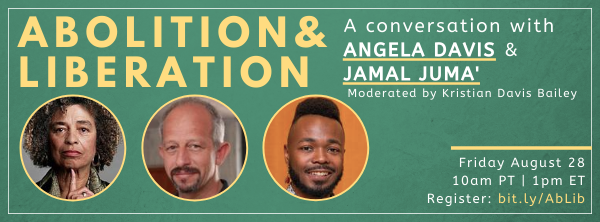 Abolition and Liberation
Abolition and Liberation
28 August 2020
Friends of Sabeel North America (FOSNA)
An international discussion of the connections between Black Lives Matter calls to defund the police and abolish the prison industrial complex, and Palestinian calls to tear down all apartheid walls and free Palestine. These speakers bring years of on-the-ground experience and strategic thinking to the conversation.
Angela Davis has been an activist and liberatory scholar since the 1960s. Her 2003 book Are Prisons Obsolete? laid the strategic groundwork for the current abolition movement, as did the first Critical Resistance Conference, which she co-organized in 1998.
Jamal Juma’, joining the session from Palestine, is a leading grassroots organizer since Palestine’s First Intifada in 1987. A founding member of the Palestinian Agricultural Relief Committees, Palestine National BDS Committee, Palestinian Association for Cultural Exchange, and Palestinian Environmental NGO Network, Juma’ is also coordinator of the Palestinian Grassroots Anti-Apartheid Wall Campaign and Stop the Wall.
Kristian Davis Bailey, who moderates their conversation, is a co-founder of Black for Palestine and a co-author of the 2015 Black Solidarity with Palestine Statement signed by more than 1,000 Black activists. He was a member of Black Youth Project 100 and Students for Justice in Palestine. Kristian currently works at Palestine Legal and is a member of LeftRoots.
Watch it here
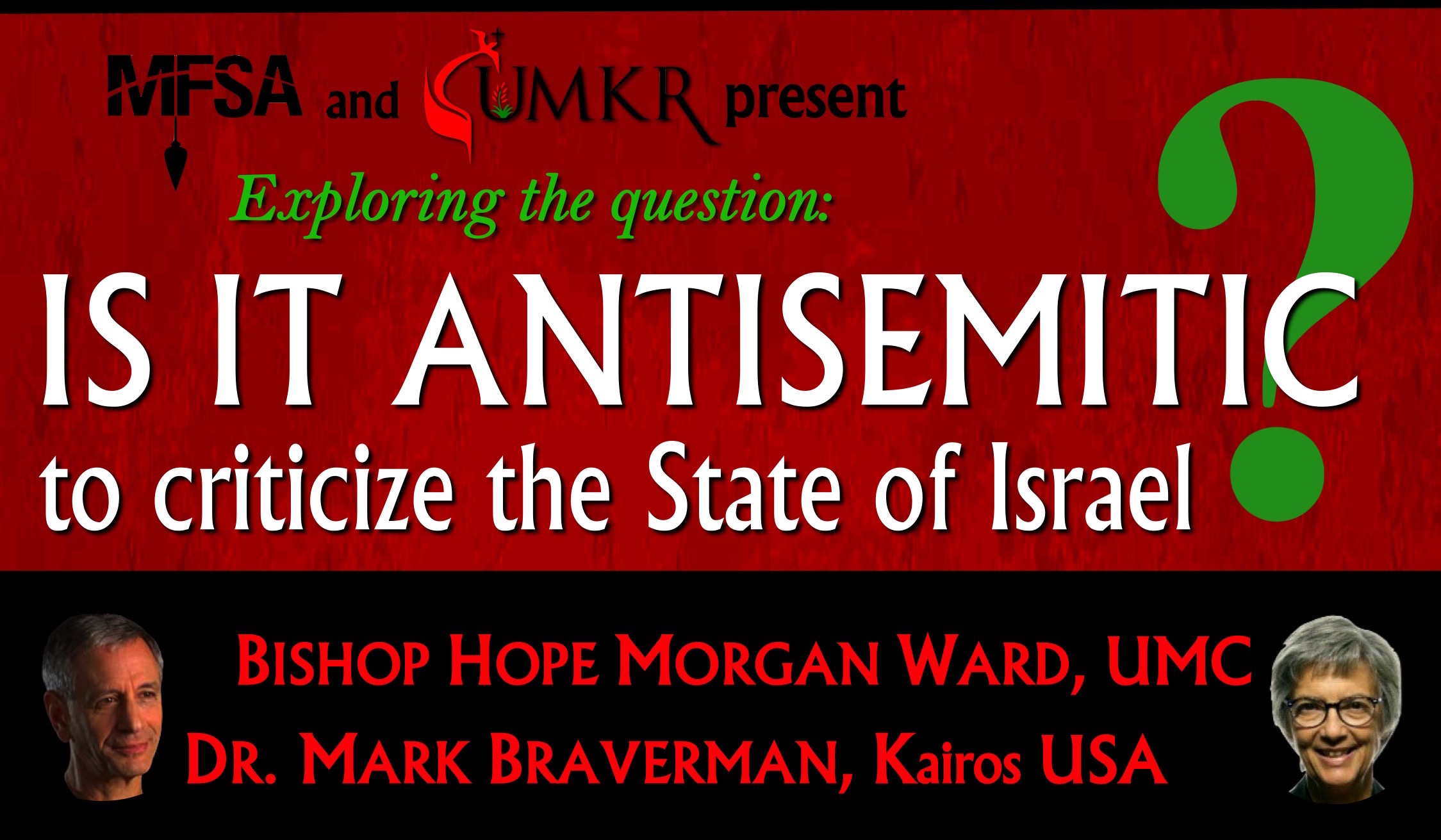 Is It Antisemitic to Criticize the State of Israel?
Is It Antisemitic to Criticize the State of Israel?
9 September 2020
United Methodists for Kairos Response (UMKR)
and Methodist Federation for Social Action (MFSA)
Antisemitism is a real and persistent evil that must be opposed and eradicated. At the same time, the charge of antisemitism can be a highly potent weapon against the movement for Palestinian rights. Today that weapon is being used throughout the US and in many other countries to destroy personal reputations, bring legal charges against certain individuals and rob others of valuable opportunities, intimidate private and governmental institutions, and shut down free speech on campuses. Our speakers will take a close look at this controversial question as it impacts the church, and discuss how we can appropriately respond.
Mark Braverman is a celebrated Jewish American author with deep ties to Israel. He serves as the Executive Director of Kairos USA, an ecumenical U.S. response to the Kairos Palestine Document and movement. His books include Fatal Embrace: Christians, Jews, and the Search for Peace in the Holy Land, and A Wall in Jerusalem: Hope, Healing, and the Struggle for Justice in Israel and Palestine.
Bishop Hope Morgan Ward is the Resident Bishop for the North Carolina Conference in the United Methodist Church; she also serves on the General Board of Church & Society. Previous positions include President of Global Ministries and President of JustPeace, the UMC’s Center for Mediation and Conflict Transformation. Bishop Ward visited Israel/Palestine with a special delegation of women bishops organized by GBCS in 2011 and has been a consistent advocate for a just peace in the Holy Land.
Watch it here
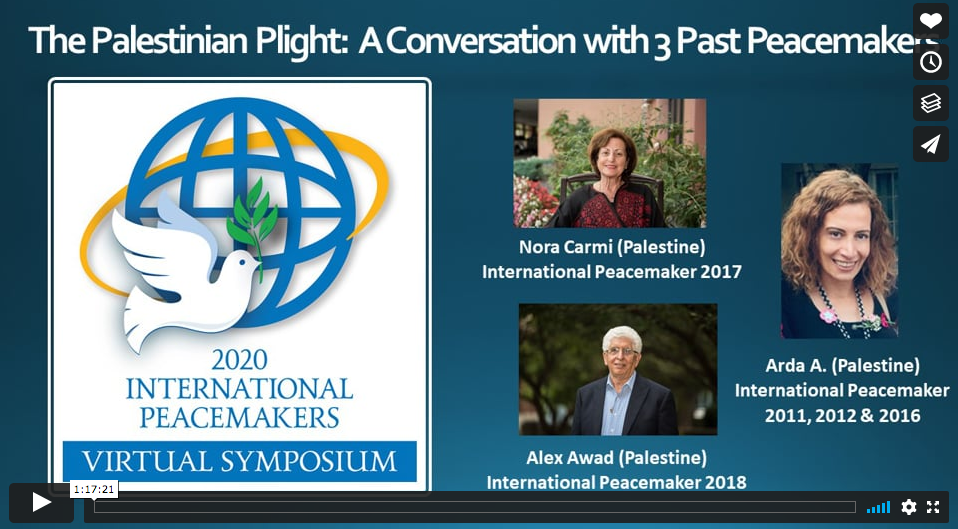 International Peacemaker Symposium:
International Peacemaker Symposium:
The Palestinian Plight: A Conversation with 3 Past Peacemakers from Palestine
17 September 2020
Presbyterian Peacemaking Program
Arda A. (Palestine, 2011, 2012 and 2016) was Project Supervisor and Media and Advocacy Coordinator at the YWCA of Palestine. Prior to that, she was Radio Producer and Presenter at RAM FM (based in Jerusalem and Ramallah). Arda was the first woman from the Middle East to serve, at a young age, on the executive board of the World YWCA Board. She was selected as a UN Media Practitioner and World Pulse Citizen Journalist.
Nora Carmi (Palestine, 2017) has held leadership positions with the YWCA of Palestine, Sabeel Liberation Theology Center, and Kairos Palestine. She has served as a community builder in Palestinian society, advocating for a just peace and empowering women and the community through skill development and spirituality. Born in Jerusalem, she describes herself as a Palestinian Christian who became a refugee in her own city, divided after the establishment of the Israeli State. She learned the value and sanctity of human life growing up in a land where conflict and strife have prevailed over six decades.
Alex Awad (Palestine, 2018) served as Dean of Students and full-time instructor at Bethlehem Bible College in Bethlehem where he served on the faculty for 24 years. He is a charter member of the college’s Board of Directors and served for years as senior pastor at East Jerusalem Baptist Church. He is a past board member of the Evangelical Local Council of Churches in the Holy Land, and directed the Shepherd Society, Bethlehem Bible College’s charitable ministry.
Watch it here
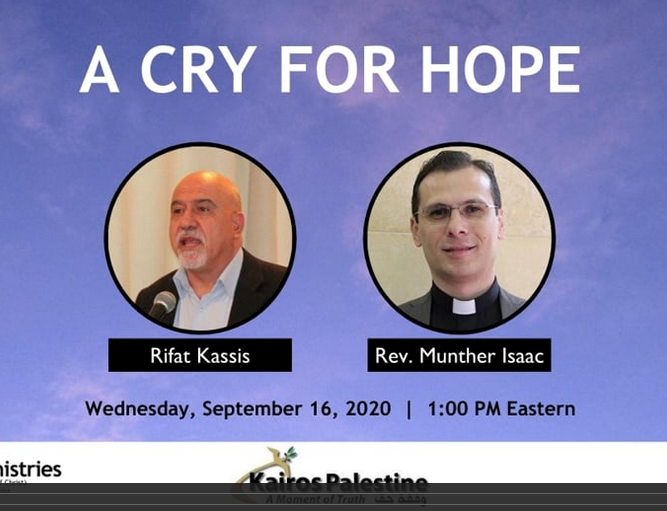 Palestine Today and the Kairos Cry for Hope
Palestine Today and the Kairos Cry for Hope
17 September 2020
United Church of Christ Global Ministries and Kairos Palestine
In a time when the COVID-19 pandemic has impacted the globe and as the struggle against historic and systemic injustice and oppression is revived, the circumstances of Palestinians living under occupation continue to worsen. The threat of Israeli annexation of large parts of the West Bank is an example of the decades of policies that have denied Palestinians their basic human and civil rights.
In this webinar conversation, two of the most prominent Palestinian Christian leaders, Rifat Kassis and the Rev. Munther Isaac, discuss the current reality, the situation of Palestinian Christians, and the recently-issued “Cry for Hope,” a letter to the world calling for attention and action to challenge injustice and to seek change to which UCC and Disciples leaders have responded.
Watch it here
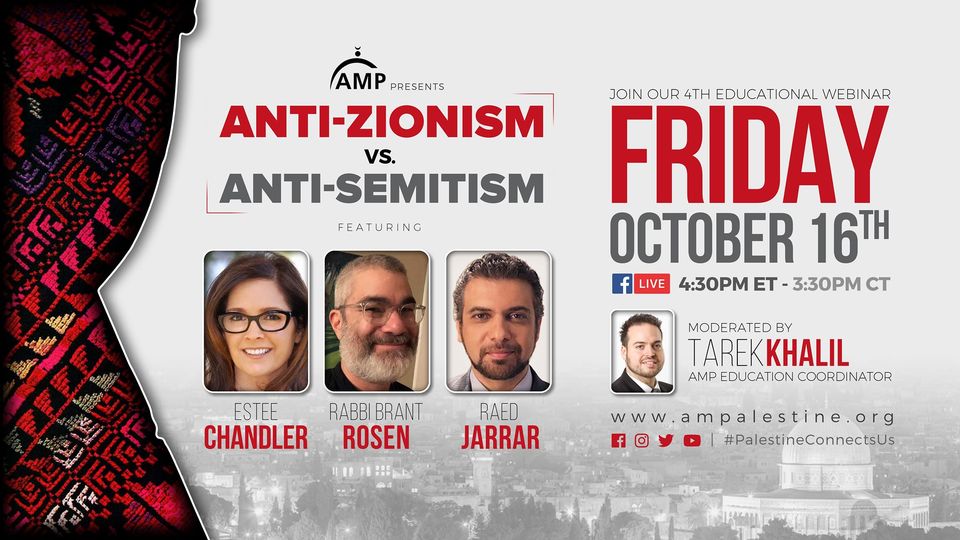 Anti-Zionism vs. Anti-Semitism
Anti-Zionism vs. Anti-Semitism
16 October 2020
American Muslims for Palestine
AMP’s 4th Education Webinar featuring:
– Estee Chandler | Jewish Voice for Peace, Board of Directors
– Rabbi Brant Rosen | Founding Rabbi, Tzedek Chicago
– Raed Jarrar | American Muslims for Palestine, Advocacy Director
– Hosted by Tarek Khalil | AMP Education Coordinator
Zionism is at the root of Palestinian oppression. In US political discourse, Anti- Zionism is oftentimes conflated with Anti-Semitism. This conflation creates confusion, mainly because these terms, which have nothing in common. Anti-Zionists oppose a nationalist, settler-colonial ideology, whereas Anti-Semites express hatred and bigotry, oftentimes resulting in governmental oppression, against Jewish people because of their religion.
Israel and its supporters deliberately attempt to conflate these terms as well. Zionism is associated with all things Israel, and since Israel is characterized as the “Jewish State,” Anti-Zionism becomes Anti-Semitism. Nothing can be further from the truth. Due to this mislabeling, individuals are demonized and condemned for opposing the oppression of the Palestinian people and standing for Palestinian human rights.
The purpose of this webinar was to highlight the necessary distinctions between Anti-Zionism and Anti-Semitism and offer intellectual contextualization that will help us to understand how these terms are misused and how to properly use them.
Watch it here





